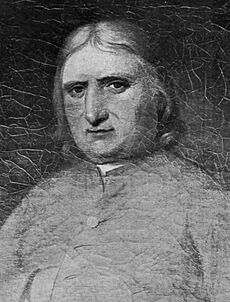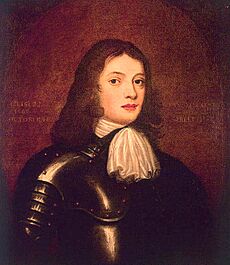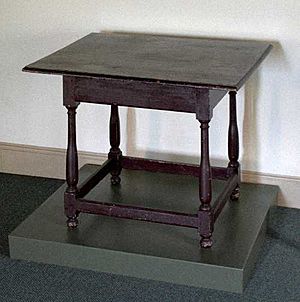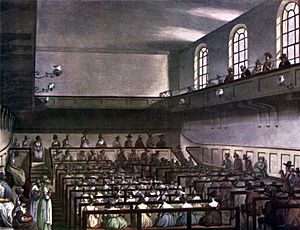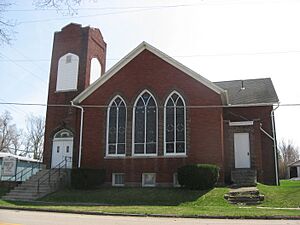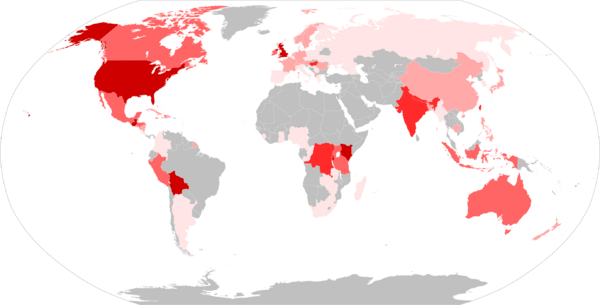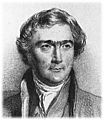Quakers facts for kids
Quick facts for kids Religious Society of Friends |
|
|---|---|
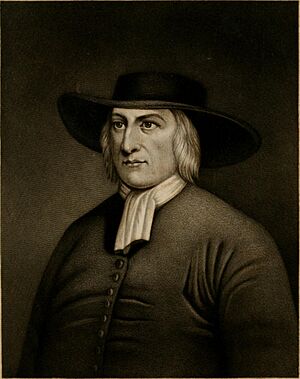
George Fox, one of the main founders of the Quakers
|
|
| Theology | Variable; depends on meeting |
| Distinct fellowships | Friends World Committee for Consultation |
| Associations | Britain Yearly Meeting, Friends United Meeting, Evangelical Friends Church International, Conservative Friends, Friends General Conference |
| Founder | George Fox Margaret Fell |
| Origin | Mid-17th century England |
| Separated from | Church of England |
| Separations | Shakers |
Quakers are members of a Christian group called the Religious Society of Friends. The group started in England in the 1600s. Members call each other "Friends," based on a Bible verse where Jesus calls his followers friends.
The name "Quaker" was originally a nickname. The founder, George Fox, once told a judge to "quake at the word of the Lord," and the name stuck.
Quakers believe that every person has an "inward light," or a piece of God's spirit inside them, that can guide them. They believe in a direct, personal relationship with God without needing priests or ministers to speak for them. This idea is often called the "priesthood of all believers."
Today, there are different types of Quakers around the world. Some have services with pastors, songs, and sermons, much like other Protestant churches. Others practice a traditional form of worship in silence, waiting for guidance from God. In 2017, there were about 377,557 adult Quakers, with the largest number living in Africa.
Contents
History of the Quakers
Beginnings in England
Quakerism began in England around the 1650s, during a time of great religious change. A young man named George Fox was unhappy with the churches of his time. He felt that they had lost their way.
Fox believed that people could experience God directly, without needing a church building or an ordained priest. He taught that "Christ has come to teach his people himself." He travelled across England, sharing his message, and many people joined him. These early Quakers, including brave women ministers, sought to live simple, honest lives guided by their faith.
Because their beliefs were different from the official Church of England, early Quakers often faced unfair treatment and were put in prison. Despite these challenges, their numbers grew.
Moving to North America
To find a place where they could practice their faith freely, many Quakers moved to North America in the 1600s. Even there, they sometimes faced harsh treatment, especially in the Puritan colonies of New England. One Quaker, Mary Dyer, was executed in Boston in 1660 for refusing to stop preaching her beliefs.
A wealthy English Quaker named William Penn wanted to create a safe place for Quakers and others. In 1681, the King of England gave him a large piece of land in America. Penn named it Pennsylvania, which means "Penn's Woods."
Penn founded the colony on the principles of peace, religious freedom, and fairness. He famously signed a peace treaty with the local Lenape Native American tribe, and this peace lasted for many years. Pennsylvania became a model for democracy and freedom in the American colonies.
Working for a Better World
Quakers have a long history of putting their beliefs into action to help others. This is often called "social justice."
Fighting to End Slavery
Quakers were among the first groups to speak out against slavery. In the 1700s, leaders like John Woolman and Anthony Benezet convinced other Quakers that owning another person was wrong. By the time of the American Revolution, almost no Quakers owned slaves.
They were leaders in the abolitionist movement, which worked to end slavery. Many Quakers, such as Levi Coffin, were also active in the Underground Railroad, a secret network that helped enslaved people escape to freedom.
Promoting Peace
A core belief for Quakers is the Peace Testimony. They believe that war and violence are wrong. Because of this, many Quakers are conscientious objectors, meaning they refuse to fight in wars.
During World War I and World War II, instead of fighting, many Quakers served in groups like the Friends' Ambulance Unit and the American Friends Service Committee. They drove ambulances, helped wounded soldiers, and provided aid to civilians affected by war. In 1947, these two groups were awarded the Nobel Peace Prize for their work.
What Do Quakers Believe?
Quakers try to live their lives according to a set of principles called "Testimonies." These are not written rules but are shared values that come from their belief in the "inward light." Many Quakers use the acronym SPICES to remember them.
- Simplicity: Living a simple life and not focusing too much on material possessions. This allows them to focus on what is truly important, like their relationship with God and others.
- Peace: Working to solve conflicts without violence and promoting justice and understanding between people and nations.
- Integrity: Being truthful and honest in everything they do. Traditionally, Quakers refused to swear oaths, believing a person's word should always be true.
- Community: Supporting one another and working together to make decisions and care for those in need.
- Equality: Believing that everyone is equal in the eyes of God. From the beginning, Quakers treated all people with respect, regardless of their gender, race, or social class. Women have always had an important role as ministers and leaders.
- Stewardship: Taking care of the Earth and the environment. They believe the world is a gift from God that must be protected for future generations.
How Do Quakers Worship?
Quaker worship is held in a "meeting house" rather than a church. There are two main styles of worship.
Unprogrammed Worship
This is the traditional form of Quaker worship, sometimes called a "silent meeting." People sit together in silence, listening for guidance from God's spirit within them. There is no pastor or planned service.
If someone feels strongly led by the spirit to share a message, they will stand and speak. This is called "vocal ministry." After they speak, the meeting returns to silence. A meeting might have several messages or none at all. After about an hour, the meeting ends with a handshake. About 11% of Quakers worldwide worship this way.
Programmed Worship
About 89% of Quakers, especially in Africa, Asia, and parts of the United States, have "programmed" worship. These services are more like those in other Protestant churches.
A programmed meeting is often led by a pastor. It usually includes singing hymns, readings from the Bible, a sermon, and prayers. There is also a period of silent worship included in the service. These meetings are often called "Friends Churches."
Making Decisions Together
Quakers have a unique way of making group decisions. They hold a special "meeting for worship for business." Instead of voting, they listen in silence for God's guidance, just as they do in worship.
People share their thoughts, and the group works together to find a solution that everyone feels is the right path forward. This is called "coming to unity" or "the sense of the meeting." They believe this process allows them to discover God's will for their community.
Quakers Today
Today, the largest populations of Quakers are in East Africa (especially Kenya), North America, and South America (especially Bolivia). The United Kingdom, where Quakerism began, still has an active community.
Quakers have also made important contributions to business and education. Many well-known companies were founded by Quaker families, including:
They also founded many schools and colleges, such as Earlham College in the United States, to provide education based on Quaker values.
Images for kids
-
The Friends' Syrian Mission built this mission house in Ramallah in 1874.
-
This meeting house in Indiana, built in 1870, had a divider that could separate men's and women's business meetings.
See also
 In Spanish: Sociedad Religiosa de los Amigos para niños
In Spanish: Sociedad Religiosa de los Amigos para niños
- David Cooper and Anthony Benezet – Quakers who worked to end slavery
- List of Christian denominations
- Quaker Oats Company – an American food company
- Peace Testimony
- Testimony of equality
- Testimony of integrity
- Testimony of simplicity
 | Jewel Prestage |
 | Ella Baker |
 | Fannie Lou Hamer |


